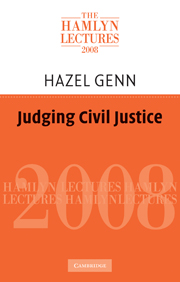5 - Conclusion
Published online by Cambridge University Press: 05 July 2014
Summary
My starting and ending point in these lectures has been the belief that the machinery of civil justice sustains social stability and economic growth by providing public processes for resolving civil disputes, for enforcing legal rights and for protecting private and personal rights. I have argued that the civil courts contribute silently to social and economic well-being and that to a certain extent we have had the luxury of taking that for granted. Unlike citizens in other jurisdictions, while our preference may be to stay well away from the courts, their relative accessibility, their historically demanding procedures and incorrupt judiciary have provided a background sense of comfort. They have enabled citizens to feel that they live in an orderly society where, if the worst should happen, their rights could and would be protected through the system of justice.
I have also argued that we are witnessing the downgrading of that civil justice system. The degradation of the courts and starving of resources are symptoms of their declining significance to government. This development can be traced to the interaction and mutual reinforcement of a number of factors including, but not limited to, the following:
escalating government expenditure on criminal prosecution, criminal defence and incarceration – all of which are paid for out of a single justice budget that must accommodate the needs of both criminal and civil justice;
consequent pressure to contain expenditure wherever possible within the justice system;
contradictory criticisms of the civil justice system that it facilitated too many claims and that it was procedurally elaborate and insufficiently accessible;
an increasingly organised and professionalised legal profession successfully enforcing rights and creatively enlarging liabilities – and charging for those services; and
the development of a new profession of mediators competing with the legal profession for its dispute-resolution work.
- Type
- Chapter
- Information
- Judging Civil Justice , pp. 181 - 188Publisher: Cambridge University PressPrint publication year: 2009

